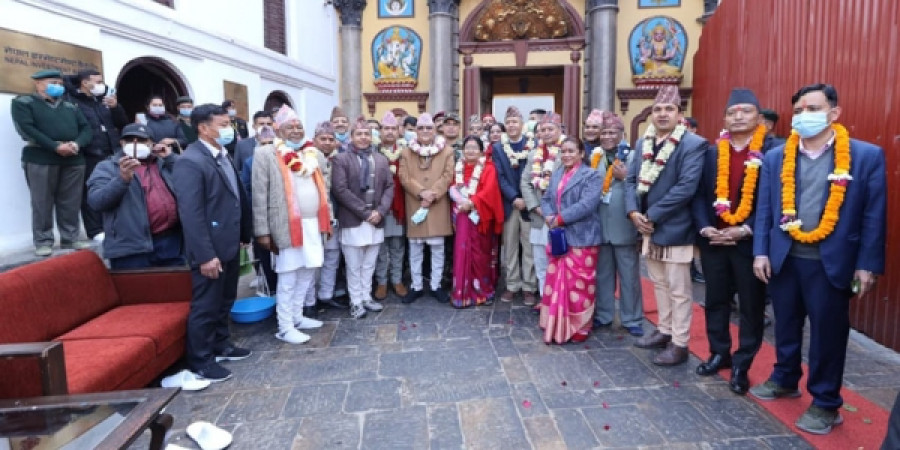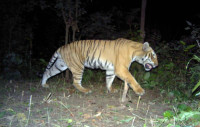National
Oli’s temple visit carries an underlying political message, leaders and observers say
Prime minister’s puja at Pashupati comes at a time when calls are growing for restoration of a Hindu state with monarchy and the country has been pushed towards uncertainty.
Anil Giri
Prime Minister KP Sharma Oli claims to be a communist. Until May 2018, his party’s name was CPN-UML (Communist Party of Nepal–Unified Marxist Leninist), which preached dialectical materialism. Like any other leader who claimed to be a communist, Oli too believed in Marx’s celebrated dictum: religion is the opium of the people.
The 69-year-old prime minister today seems to have shed all his communist characteristics. There was a time when he was hauled to jail where he spent 14 years for opposing the Panchayat regime under the now-abolished monarchy in the 1970s and 1980s. He, however, faces charges of acting like a monarch these days, 12 years after the country deposed Gyanendra, consigning him to history as the last monarch of the Shah dynasty that ruled Nepal for over 240 years.
And on Monday, Oli went to the Pashupatinath temple. He spent a little over an hour and performed a special puja. He then instructed officials of the Pashupati Area Development Trust to develop the revered Hindu pilgrimage site as a holy place for “adherents of Vedic Sanatan Dharma”.
The sudden inclination of Oli, who has never been reported to have visited any temple to perform puja, towards Hindu gods has left many perplexed, also because it comes at a time when the country is seeing mass demonstrations demanding reinstatement of Hindu state and the monarchy. This also comes on the heels of his decision to dissolve the House of Representatives, a move which has been argued as an attack on the constitution which made Nepal a secular republic.
Oli is the first communist prime minister to visit Pashupatinath temple for a puja. Other communist prime ministers like Manmohan Adhikari, Madhav Kumar Nepal, Pushpa Kamal Dahal, Baburam Bhattarai and Jhala Nath Khanal never visited the temple during their tenures and some of them even refused to take the oath of office “in the name of god”.
Observers say Oli’s visit to the Hindu temple may be a calculated move with some political agenda.
“Oli has left no stone unturned to dismantle federalism and now he seems to be moving towards getting rid of secularism,” said Shyam Shrestha, a political analyst who has followed Nepal’s leftist movements for decades. “He is in a bid to make the pro-monarchy, pro-Hindu constituency happy.”
In Nepal, pro-monarchy, pro-Hindu forces are scattered and they function under different names. The only party which is politically organised and making a pitch for reinstatement of the monarchy and the Hindu state is Rastriya Prajatantra Party. Until Oli dissolved the House, the party had a representation there with one seat.
The Rastriya Prajatantra Party had vehemently opposed the abolition of the monarchy and declaration of Nepal as a secular state.
But it was during Oli’s first stint as prime minister from October 2015 to August 2016 that the party’s leader, Kamal Thapa, was deputy prime minister and foreign minister.
When Oli dissolved the House on December 20, the Rastriya Prajatantra Party did not welcome the move immediately.
A senior party leader, however, told the Post on condition of anonymity that the party endorsed Oli’s decision to seek a fresh mandate after a few days following a meeting between party chair Kamal Thapa and Oli.
Oli’s decision to call snap polls for April 30 and May 10 has come as an encouraging piece of news for pro-Hindu, pro-monarchy forces, according to the leader.
This may be a public visit to a temple by Oli, but his inclination towards everything Hindu has been in public display for quite a while. In July last year, Oli had sparked controversy by claiming that the real birthplace of lord Ram is in Nepal—not in Ayodhya of India. Oli also has instructed officials and local elected representatives to build a Ram temple in Ayodhyapuri, Chitwan, and develop it as a Hindu religious site.
Given the way political developments are unfolding in the country and the way Oli is making statements and doing things, it’s natural for people to believe that Nepal could revert to a Hindu state, according to Shekhar Koirala, a senior Nepali Congress leader.
“Nepal as a Hindu state seems to be very much on the cards. It may happen during Oli’s regime or some time later,” Koirala told the Post. “There is a political uncertainty now. But if elections fail to take place on the dates declared by Oli, more demonstrations will be there and chances of pro-Hindu forces hitting the streets are high.”
Oli returned to power in February 2018 on a nationalistic plank, ratcheting up anti-India sentiments following months-long border blockade by Delhi which was unhappy with the new Nepal constitution.
With a clear pro-China tilt, Oli continued to thrive on ultranationist rhetoric. But after the Nepal Communist Party split, despite efforts by the Chinese to keep it united, following Oli’s House dissolution move, he has been trying to strike a fine balance, sending messages to Delhi too that he is ready to play along.
There are many in Nepal who believe restoring Nepal as a Hindu state is one of the key agendas of India’s ruling Bharatiya Janata Party. Indian Prime Minister Narendra Modi, a pro-Hindu leader, has often hailed Nepal’s Hindu pilgrimages, explaining how the houses of worship in Nepal and India are linked.
Modi, a devout Hindu leader, is known for visiting temples and offering prayers for hours. The recent one that attracted widespread coverage and reactions was when Modi attended an elaborated ‘Dev Deepawali” function in Varanasi.
Some say Oli’s puja on Monday came as a reminder of Modi, who in August 2014 had offered special prayers at Pashupatinath.
Apart from pro-Hindu forces, including the Rastriya Prajatantra Party, some sections of the Nepali Congress too are not averse to the idea of restoring Nepal as a Hindu state.
Shashanka Koirala, a Nepali Congress leader who is a cousin of Shekhar, had even declared recently that there would be a referendum on reversing Nepal to a Hindu state.
Many in Oli’s orbit, however, themselves are confused and they say it’s very difficult to get into his head.
A leader close to Oli, who did not wish to be named, said that there is a tendency among people to criticise Oli for whatever he does.
“Have you forgotten how he was heavily criticised as being pro-Christian when he participated in a conference some two years ago?” said the leader.
In December 2018, Oli attracted widespread criticism for attending the inaugural session of the Asia Pacific Summit, organised by the controversial South Korea-based non-government organisation Universal Peace Federation.
“There’s no big deal if he offered prayers at a Hindu temple,” said the leader. “He has faced criticism in the past and he is facing now also. It’s wrong to brand him as someone who is promoting one religion or the other.”
But things need to be seen in a larger perspective, according to a comunist leader who is known as someone well-versed in Marxism.
“We [as communists] believe in science,” said Ram Karki, a leader in the Pushpa Kamal Dahal-Madhav Kumar Nepal faction. “Science has never been something Oli believed in and what he did today just suits him and his character.”
Karki believes Oli’s visit to Pashupatinath Temple is aimed at testing the waters.
“He is trying to check how the society responds,” Karki told the Post. “But he must remember that he is not a monarch. His action may appease his constituency, but offering prayers in a temple does not suit a communist prime minister.”
According to Karki, oftentimes leaders tend to play the religion card when they face a legitimacy crisis.
Marx’s dictum that religion is the opium of the people carries a meaning in which he describes religion as harmful to revolutionary goals, as it prevents people from seeing the class structure and oppression around them, thus it could prevent the socialist revolution.
Even though Oli is known as the main protagonist at whose behest the constitution was rushed in September 2015 amid opposition from various sections of society and some Madhes-based parties, his commitment to the very constitution has often been questioned.
Many have described his House dissolution move as a constitutional coup. The Supreme Court is currently hearing as many as 13 writ petitions against Oli’s decision to dissolve the House.
Sunil Pokhrel, a former secretary general of Nepal Bar Association, is one of the lawyers pleading on behalf of the petitioners.
“There have been concerns for quite some time if Oli is bent on suspending articles related to secularism and federalism,” Pokhrel told the Post.
Article 4 of the constitution under the title “State of Nepal” states that Nepal is an independent, indivisible, sovereign, secular, inclusive, democratic, socialism-oriented, federal democratic republican state.
“Today’s event cannot be seen simply as a worshipper going to the temple,” Pokhrel told the Post. “Oli has been very calculative and making long-term plans to suspend the articles of the constitution related to secularism and federalism before going to elections.”
According to Pokhrel, Oli’s visit to Pashupati is also an attempt to garner support from the pro-Hindu, pro-monarchy forces.
“That’s why you can see some lawyers who have been making a pitch for restoration of the monarchy and Hindu state are pleading on behalf of Oli,” said Pokhrel, buttressing his argument.
Some senior advocates like Sushil Pant, Surendra Bhandari, Balkrishna Neupane and Bishnu Prasad Bhattarai, who have been publicly demanding scrapping of secular republic, are arguing on behalf of Oli.
Oli’s rivals from the Nepal Communist Party, including Dahal and Nepal, of late have been accusing him of trying to take the country on the regressive path, thereby squandering all hard-earned achievements—constitution, secularism and federalism.
Leaders close to Oli, however, defend him, saying that the prime minister equally respects all religions and beliefs.
“When he was prime minister in 2016 and I was minister for tourism and culture, it was Oli who inaugurated the World Buddhist Conference in Lumbini,” Anand Pokhrel, a leader close to Oli told the Post.
“During his earlier stint, he visited the Taleju temple area, Lumbini and other world heritage sites. Allegations that the prime minister is going to revert the country to a Hindu state are baseless,” said Pokhrel. “How is it possible without amending the constitution for which a two-thirds majority is required?”
Questions, however, have been raised over Oli’s commitment to the constitution. In the letter recommending that the President dissolve the House, which appeared into public domain a few days ago, Oli says he was forced to dissolve the House because he needed a two-thirds majority to accomplish, among other tasks, constitutional amendments.
Shrestha, the political analyst, said Oli was never committed to the constitution and the deadly blow he had dealt to the constitution by dissolving the House just shows that.
“Oli has given indications in the past too that he is not a communist anymore and that he is bent on destroying the system,” said Shrestha. “Now he is proving it by his actions.”




 12.12°C Kathmandu
12.12°C Kathmandu















